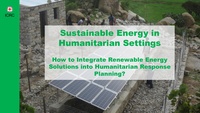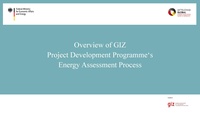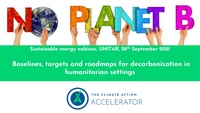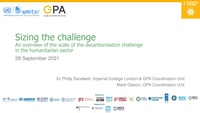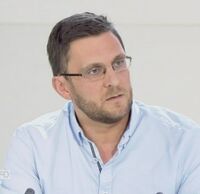Webinar on How to Integrate Renewable Energy Solutions into Humanitarian Response Planning?
What is the need for and challenges of switching to renewable energy infrastructure in the humanitarian context? This webinar focuses on the decarbonisation of energy infrastructure and the associated challenges and opportunities in the humanitarian sector. Experts will share their insights on the need and processes for decarbonisation of energy infrastructure in humanitarian responses, how to establish an organisational baseline and roadmap for emissions reductions, and share financial projections on what is needed to decarbonise the humanitarian sector.
This webinar is the first of three webinars focusing on the decarbonisation of energy infrastructure in displacement situations, taking place in September, October and November 2021. The webinars will share knowledge and good practice on how to switch from fossil fuel-based energy sources to renewable ones; provide technical tools and processes to make the transition happen; and last, but not least, share lessons learnt and experience from the ground.
Presentations
Speakers
Kathrine Alkjaersig VAG, International Committee of the Red Cross (ICRC): With over 10 years of experience as an expert in environmental management notably at DuPont Sustainable Solutions, the strategic consulting company in sustainable energy E4tech and the Netherlands Environmental Assessment Agency, Kathrine Vad is since 2017 the ICRC’s Environment and Climate Change Advisor. One of the ICRC’s strategic objectives for 2024 is to bolster the sustainability of its humanitarian response which is why in her role, Kathrine strives to enhance the ICRC’s own environmental responsibilities and to further environmental and climate change practices within the ICRC’s assistance programmes”.
Maryanne Maina, Humanitarian Settings Component - GIZ Project Development Programme Humanitarian Component: Maryanne is a sustainability professional with over 10 years’ experience working in the renewable energy, energy efficiency and climate finance sectors. She is currently a project manager within the GIZ Project Development Programme under the German Energy Solutions Initiative supporting the humanitarian sector with their objective of meeting net zero greenhouse gas emissions targets. She is also responsible for the project’s activities in Kenya and Ghana.
Bruno Jochum, Climate Action Accelerator: Bruno Jochum is the Director of the Climate Action Accelerator, a new non-for-profit initiative based in Geneva aiming to support aid and health organisations to halve their emissions by 2030, turn them into vectors of change and share climate solutions as an open source common good within a community of practice. Previously Director-General of Médecins sans Frontières Switzerland, a medical humanitarian organisation with 7,000 employees in 24 countries, he is the author of several articles on the humanitarian and aid dimensions of the climate crisis. He is a Global Fellow at the Geneva Centre for Security Policy and a regular contributor on climate at Geneva Solutions, an online media launched by Heidinews.
Philip Sandwell, Imperial College London: Dr Philip Sandwell is a Research Associate at Imperial College London and is currently seconded to the GPA Coordination Unit at UNITAR. His research focuses on techno-economic modelling and optimisation of solar minigrids, and the impacts and opportunities for decarbonisation in situations of displacement.
Organizers

